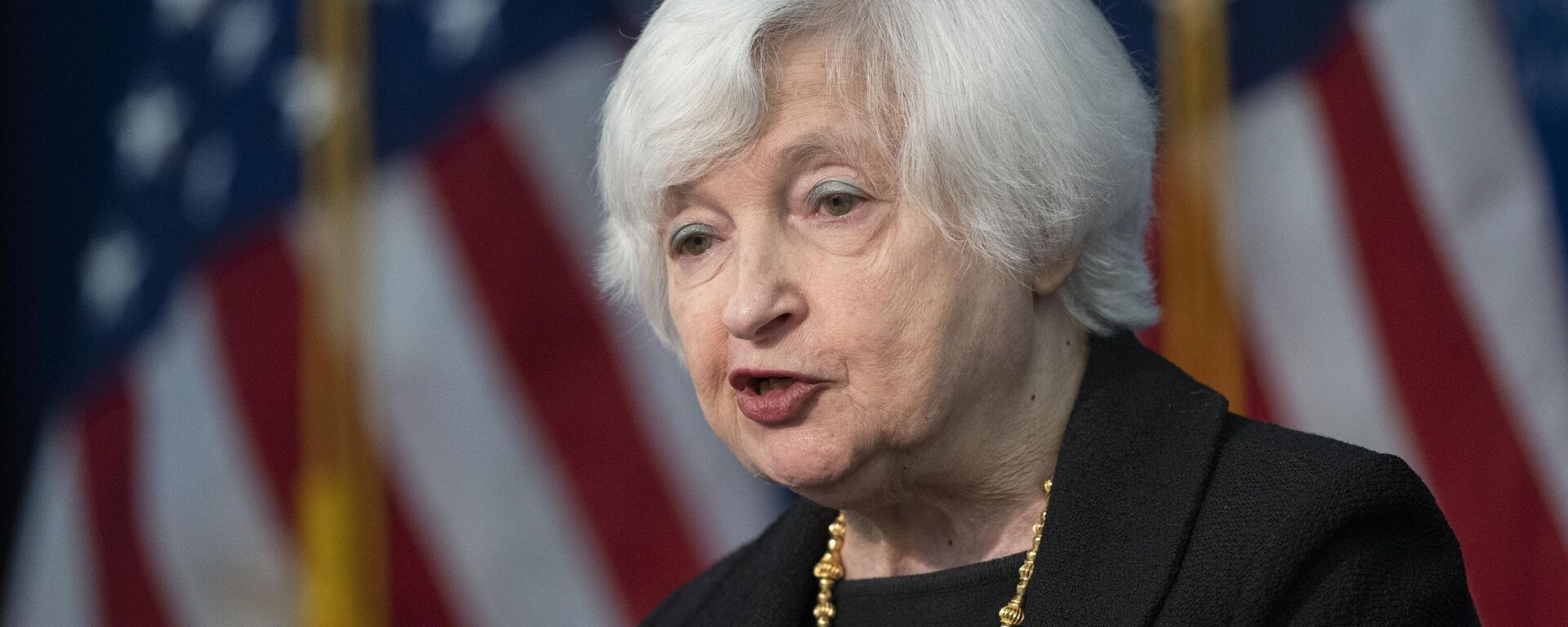https://sputnikglobe.com/20240825/new-research-suggests-that-us-treasuries-are-not-a-safe-haven---report-1119897991.html
New Research Suggests That US Treasuries Are Not a 'Safe Haven' - Report
New Research Suggests That US Treasuries Are Not a 'Safe Haven' - Report
Sputnik International
New research presented at the Kansas City Fed’s annual research conference in the US state of Wyoming has found cracks in US Treasuries once labeled as “safe haven” securities.
2024-08-25T04:57+0000
2024-08-25T04:57+0000
2024-08-25T04:57+0000
economy
treasury
us
economy
covid-19
us economy
national debt
debt
economic crisis
https://cdn1.img.sputnikglobe.com/img/07e8/08/19/1119899649_0:208:2899:1839_1920x0_80_0_0_ff72ac62dfda7e0d402e084c287ed636.jpg
New research presented at the Kansas City Fed’s annual research conference in the US state of Wyoming has found cracks in US Treasuries once labeled as “safe haven” securities. The issue is connected to an unsurprising culprit: the COVID-19 pandemic.The behavior of US Treasuries during and after the global outbreak has called into question the fitness of these Treasuries in terms of their security. The research suggests that these Treasuries are “little different from the debt issued by the likes of Germany, Britain, France, or even big corporations,” a recent report from US News detailed.The research found that the US government has enjoyed an “exorbitant privilege” to borrow broadly on the global market despite its own growing federal budget gaps.The researchers found that investors did not stock up on Treasuries which would have increased their volume but marked down Treasury securities as they did for bonds from other countries.
https://sputnikglobe.com/20240617/us-treasury-secretary-says-seizing-profits-from-russian-assets-not-theft-1118991463.html
Sputnik International
feedback@sputniknews.com
+74956456601
MIA „Rossiya Segodnya“
2024
News
en_EN
Sputnik International
feedback@sputniknews.com
+74956456601
MIA „Rossiya Segodnya“
Sputnik International
feedback@sputniknews.com
+74956456601
MIA „Rossiya Segodnya“
us treasury, economic crisis, national debt, us economy, failing economy, economic policy, failed country, failed economy, covid-19, pandemic crisis, economic downfall
us treasury, economic crisis, national debt, us economy, failing economy, economic policy, failed country, failed economy, covid-19, pandemic crisis, economic downfall
New Research Suggests That US Treasuries Are Not a 'Safe Haven' - Report
Treasury Department officials have criticized the research as failing to account for the uncertainty that the pandemic caused, and that hundreds of billions of dollars of fiscal response was financed without issue to respond to the crisis.
New research presented at the Kansas City Fed’s annual research conference in the US state of Wyoming has found cracks in US Treasuries once labeled as “safe haven” securities. The issue is connected to an unsurprising culprit: the COVID-19 pandemic.
The behavior of US Treasuries during and after the global outbreak has called into question the fitness of these Treasuries in terms of their security. The research suggests that these Treasuries are “little different from the debt issued by the likes of Germany, Britain, France, or even big corporations,” a recent report from
US News detailed.
The research found that the US government has enjoyed an “exorbitant privilege” to borrow broadly on the global market despite its own growing federal budget gaps.
"In response to COVID, U.S. Treasury investors seem to have shifted to the risky debt model when pricing Treasuries," wrote Roberto Gomez-Cram, Howard Kung and Hanno Lustig in the paper. "Policymakers, including central banks, should internalize this shift when assessing whether bond markets are functioning properly."
The researchers found that investors did not stock up on Treasuries which would have increased their volume but marked down Treasury securities as they did for bonds from other countries.
"In the risky debt regime, valuations will respond to government spending shocks, which may involve large yield changes in bond markets," the researchers explained.
"In this environment, large-scale asset purchases by central banks in response to a large government spending increase have undesirable public finance implications," they wrote. "These purchases, which provide temporary price support, destroy value for taxpayers but subsidize bondholders.”



